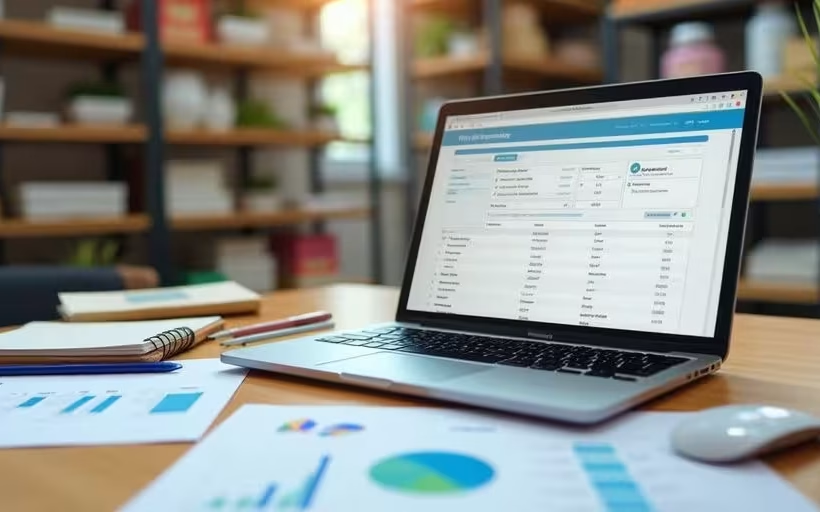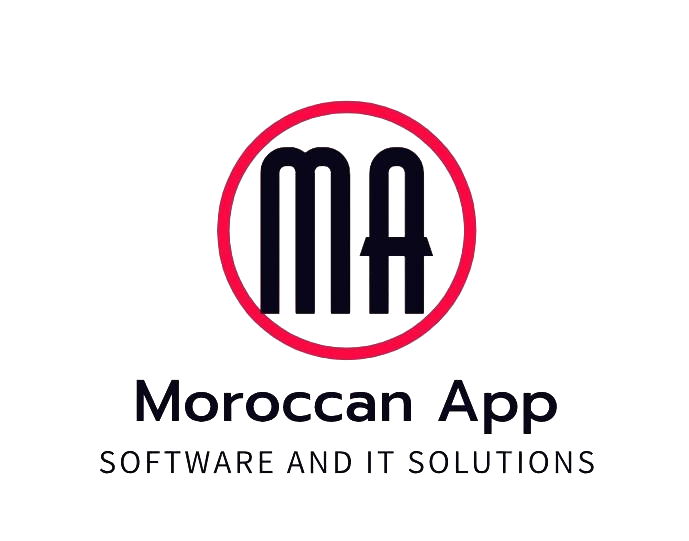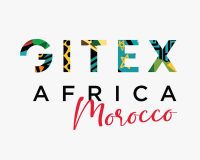- Mon - Sat 8:00 - 17:30, Sunday - CLOSED

Optimize your business management with invoicing and inventory software in Morocco
In today’s business world, Moroccan companies must quickly adapt to market changes. The use of billing and inventory management software is essential to improve the efficiency and compliance of operations. This article explores the benefits, key features, and technological trends shaping the future of these tools in Morocco. Key Points Billing and inventory management software increases the efficiency of Moroccan companies. They help reduce costs by automating processes. These tools make it easy to comply with local regulations. Features like real-time tracking facilitate inventory management. The integration of artificial intelligence improves decision-making. Benefits of Billing and Inventory Software in Morocco Billing and inventory software in Morocco brings numerous benefits to businesses. They simplify business management and improve operational efficiency. Here are some key advantages: Improvement of Operational Efficiency Task Automation: This software allows for the automation of repetitive tasks, reducing the time spent on management. Data Centralization: All information is gathered in one place, making access and management easier. Improved Communication: Teams can collaborate more effectively through integrated tools. Reduction of Operational Costs Decrease in Errors: Automation reduces human errors, which lowers costs associated with corrections. Time Savings: Less time spent on manual tasks means more time to focus on business growth. Better Resource Management: Accurate inventory tracking helps avoid overstocking and stockouts. Compliance with Local Regulations Compliance with Laws: This software helps businesses comply with Moroccan tax and accounting regulations. Automatic Updates: The software is often updated to reflect changes in legislation. Compliant Reports: They generate reports that meet the requirements of local authorities. In summary, billing and inventory software in Morocco are essential solutions that help improve business processes, reduce costs, and increase inventory accuracy. They are crucial for any business looking to modernize and remain competitive in the market. Key Features of Integrated Solutions Integrated billing and inventory software are essential for businesses in Morocco, as they offer several features that facilitate the management of business operations. Here are the main features: Automated Inventory Management Real-time tracking of inventory levels. Automatic alerts for restocking. Management of product inflows and outflows. Real-Time Transaction Tracking Instant recording of sales and purchases. Access to up-to-date financial reports. Visualization of business performance at any time. Customization of Settings Create documents that reflect your brand, such as quotes and invoices. Adjust settings according to the specific needs of your business. Easily integrate other tools for better efficiency. In summary, this software allows for the automation and digitization of inventory management, providing numerous benefits to Moroccan businesses. Comparison of Cloud and Local Solutions Choosing between cloud solutions and local solutions for your billing and inventory management software in Morocco can be challenging. Here is an overview of the advantages and disadvantages of each option. Advantages of Cloud Solutions Quick Setup: Cloud solutions are generally easier and faster to install. Automatic Updates: Cloud software updates automatically, allowing you to benefit from the latest features effortlessly. Accessibility: You can access your data from anywhere, which is ideal for remote work. Security and Privacy of Local Solutions Total Control: With a local solution, you have complete control over your data, which can be crucial for security. Less Dependence on the Internet: Local solutions do not require a constant internet connection, which can be an advantage in certain situations. Customization: They can be more easily customized to meet the specific needs of your business. Selection Criteria Based on Needs Needs Assessment: Identify what is most important for your business, such as security or ease of access. Budget: Compare the installation and maintenance costs of both types of solutions. Technical Support: Ensure that the provider offers good support to quickly resolve issues. Solution Main Advantages Main Disadvantages Cloud Solutions Ease of access, automatic updates Dependence on the Internet Local Solutions Total control, customization More complex installation Ultimately, the choice between a cloud solution and a local solution will depend on the specific needs of your business and your security priorities. Carefully evaluate your options to make the best choice. Impact of Automation on Productivity The automation of processes in Moroccan businesses has a significant impact on their productivity. By integrating billing and inventory management software, businesses can modernize their operations and improve their efficiency. Reduction of Human Errors Automation decreases errors related to manual tasks. This helps reduce costs associated with corrections. Employees can focus on more important tasks. Time Savings for Strategic Tasks Software automates repetitive tasks, freeing up time. Teams can focus on high-value projects. This improves employee satisfaction and engagement. Improvement of Customer Service Real-time transaction tracking allows for better responsiveness. Businesses can offer faster and more accurate service. This contributes to a better customer experience and loyalty. In summary, integrating automation into business processes is essential for Moroccan companies. It allows them to remain competitive in a constantly evolving market while optimizing their daily management. The impact of automation is therefore clear: it transforms the way businesses operate, increasing their productivity and efficiency. Criteria for Choosing Billing and Inventory Software Choosing billing and inventory management software is an important step for any business in Morocco. Here are some essential criteria to consider: Assessment of Specific Needs Identify Necessary Features: Think about what your business needs to manage, such as billing, inventory tracking, and reporting. Consider the Size of Your Business: The needs of a small business are not the same as those of a large one. Think About Scalability: Choose software that can grow with your business. Budget and Return on Investment Establish a Clear Budget: Determine how much you are willing to invest in software. Compare Prices: Look at several options and their features to assess value for money. Consider Hidden Costs: Think about maintenance, training, and update fees. Compatibility with Current Environment Check Integration: Ensure that the software can connect with other tools you are already using. Consider Ease of Use: Complicated software can slow down your team. Evaluate Compliance: It is crucial that the software complies with local accounting standards to avoid legal issues. In summary, choosing billing and inventory management software should be a thoughtful process. It

How to choose the right software for your business in Morocco
Introduction to the Importance of Software for Business Software plays a crucial role in the success of modern businesses, including in Morocco. Their benefits are evident in various aspects such as productivity, data management, communication, and operational efficiency. Here are some key points on the importance of software: Optimizing Productivity Improved Data Management Effective Communication Operational Efficiency Data Security The importance of software in businesses is undeniable. They not only contribute to the optimization of internal processes but also to the creation of a more agile and resilient work environment. Using the right software tools is therefore essential to remain competitive in a constantly changing market. Identify the specific needs of your business When it comes to choosing the right software for a business in Morocco, it is crucial to understand the specific needs of the business. Here are some essential steps to achieve this: Practical example For example, a retail business may require specific features for inventory management, a robust point-of-sale (POS) system, and analytical tools to forecast demand. By examining these specific needs, it can ensure that the chosen software will effectively contribute to its daily operations and long-term goals. By summarizing these elements, a company in Morocco can clearly identify its needs and choose a suitable software that will support its growth and operational efficiency. The Types of Enterprise Software Available When a company is looking to adopt new software, there are several types of solutions available on the market. Here is an overview of the main categories: 1. Customer Relationship Management (CRM) Software CRMs help manage interactions with potential and existing customers. They help track sales, marketing, and after-sales services. 2. Human Resources Management Software (HRM) Pricing and Licensing Options Compare Pricing and Licensing Options available licenses are necessary to choose software that fits your budget. Common options include: Permanent Licenses: One-time purchase Subscriptions: Monthly or annual payments Software open source : Cheaper alternatives Integration and compatibility Software compatibility with the company’s existing systems should be checked. Things to Consider: Compatibility with popular operating systems (Windows, MacOS, Linux) Integration with other tools used in the company Possibility of migrating existing data Market Trends Stay informed about current trends in the Moroccan market software helps you make informed choices. Trends to watch include: Cloud computing < strong>Artificial Intelligence Data Security Analyzing these aspects can help to identify software solutions that are not only relevant today, but also sustainable for the future of the business. Compare Software Features and Performance When choosing software for a business in Morocco, it is crucial to compare the features and performance of the different options available. Here are some things to consider: Basic Features: Accounting: Should the software be able to adequately manage the company’s accounting? Payroll Management: Does it offer options to manage employee payroll? ? Invoicing: Does it allow the creation and management of invoices efficiently? Integration with d other tools : CRM: Can the software integrate with a CRM for better customer relationship management? Inventory Management Software: Can it synchronize with inventory management software? ERP: Does it offer integrations with ERP systems for overall business management? Performance: Response time: Is the speed of task execution satisfactory? Reliability: Does the software experience frequent interruptions or stability issues? Scalability: Can it adapt to the growing needs of the company? Security: Data Protection: Is the company’s data protected against cyber threats? Backups: Are there automatic data backup systems? Support and Assistance: Technical support: Does the vendor offer responsive and knowledgeable technical support? Updates: Are software updates regular and relevant? Total cost of ownership: Purchase price: What is the initial cost of the software? ? Recurring Fees: Are there any monthly/annual maintenance or subscription fees? Training: Do staff need to undergo costly training to use the software? It is important to create a comparison matrix of the various software to assess which one best meets the specific needs of the company. Considering the above criteria helps ensure that the chosen software will be able to improve the efficiency and productivity of the company while meeting its specific requirements. Analyze the cost and return on investment When choosing software for a business in Morocco, it is essential to analyze the cost and return on investment (ROI). This exercise helps ensure that acquiring and implementing the software will provide tangible financial and operational benefits. Costs to Consider Initial Cost: This includes the purchase price or license of the software. Businesses should compare different offerings to find the one that meets their needs and budget. Recurring costs: These costs include maintenance fees, updates, and license renewals. They can be annual or monthly depending on the provider’s policy. Training and support: Integrating new software may require staff training. Training costs and technical support should be considered. Hidden costs: These may include downtime during implementation, necessary integrations with other systems, or possible customizations. Estimating ROI To calculate ROI, you need to weigh the expected benefits against the costs incurred. The following elements should be considered: Productivity gains: Effective software can speed up processes, reduce errors, and improve efficiency. Saving time and reducing manual tasks are important benefits. Reduced operational costs: Automation and optimization of processes can reduce savings in the long term, particularly in terms of human and material resources. Improved customer service: Well-chosen software can improve customer relations through better management of data and customer interactions. This can lead to increased customer loyalty and increased sales. Competitive Advantage: A company with advanced technology solutions can stand out from the competition and attract more customers. “Investing in the right software can transform day-to-day operations and generate benefits that go beyond simple financial savings.” By carefully considering these aspects, a company in Morocco can make an informed choice that maximizes its benefits and minimizes its costs. Security and Data Protection Considerations When choosing software for a business in Morocco, security and data protection considerations are crucial. Failure to ensure adequate security can put the business at risk of cyberattacks, data breaches, and other online threats. Data Encryption: It

Accounting software in Morocco: The essential tools
Introduction to Accounting Software in Morocco In Morocco, the accounting management of companies is facilitated by the use of specialized accounting software. These digital tools offer a multitude of features aimed at optimizing and simplifying the maintenance of accounts. Choosing the right accounting software can help businesses manage their finances more efficiently and in compliance with local regulations. Why use accounting software? Accounting software allows you to: Key Features A good accounting software must include several essential features: Benefits for Moroccan companies Moroccan companies, whether small, medium or large, can benefit substantial benefits of using accounting software: Note: It is crucial for companies to choose software that is adapted to their specific needs and their sector of activity. The use of accounting software in Morocco is a strategic solution to improve financial management and support business growth. Advanced features and significant benefits not only ensure compliance and accuracy, but also enable informed decisions based on financially sound data. The Importance of Accounting Software for Moroccan Businesses Accounting software is a crucial tool for businesses operating in the Moroccan economic landscape. Due to the complexity of tax regulations and exlocal accounting agencies, the adoption of efficient accounting software becomes essential. These softwares offer a series of advantages to optimize financial operations within Moroccan companies. Automation of Accounting Tasks The automation of repetitive and tedious tasks is one of the main advantages of accounting software. This includes: Regulatory Compliance Moroccan companies must comply with tax and accounting standards set by local authorities. A good accounting software ensures: Time Saving and Efficiency By centralizing financial data, accounting software allows for significant time savings and improves team efficiency: Improved Decision Making Having accurate and real-time financial reports helps managers make informed decisions. The analytical features of accounting software allow you to: Data Security The integrity and security of financial data are essential. A robust accounting software offers: In In short, the adoption of accounting software adapted to the specificities of the Moroccan market is essential for companies aiming to improve their financial management and ensure their sustainable growth. Essential Features of Accounting Software accounting software plays a decisive role in the financial management of companies, by simplifying accounting tasks and ensuring compliance with regulations. For accounting software to be effective and essential, it must have certain essential features. Thus, when a company in Morocco evaluates various accounting software, it is crucial that it takes into account these essential characteristics in order to choose a tool that is adapted to its specific needs and capable of ensuring optimal accounting management. Comparison of the Main Accounting Software in Morocco The Moroccan accounting market has experienced a significant evolution in recent years thanks to the introduction of various efficient accounting software. These tools are designed to meet the needs of businesses of different sizes and industries. Here is a comparison of the main accounting software available in Morocco:



